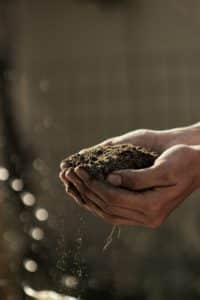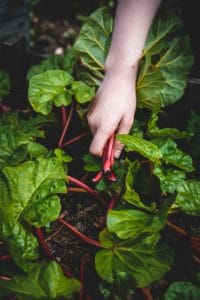Gardening as Part of Holistic Recovery
Holistic recovery, in its greatest sense, means so much more than maintaining sobriety after addiction. Recovery is about identifying and reclaiming your best life, one in which you thrive in all areas of being, including connecting to what makes you come alive. In other words, an integral part of holistic recovery is about finding and living what you love about the world now that addiction is no longer in your way.
Part of Holistic Recovery is about finding your passion.
Early recovery can be a beautiful, bittersweet time to try new things, connect with new people, find your higher purpose, and begin to build the life you have always wanted to live.
Because of the numerous physical and mental health benefits of gardening, digging in the dirt and making things grow presents a beautiful addition to a holistic recovery plan. Here are some of the ways in which gardening can support and enhance life in recovery:
1. Gardening is a Mindfulness Practice
The repetitive sensory experience of pulling weeds, pruning a lilac, or sowing rows of seeds engages the senses and calms the nervous system. These types of physical activities can be highly meditative when you let your thoughts go and focus on the work your hands are doing.
The consistency of the dirt, the warmth of the sun, the smells and textures of the flowers you are working with, and the refreshing coolness of dew droplets left on a leaf all have the potential to draw you out of your head and into the present moment in all its serenity.
Because so much of gardening is repetitive, it gives us the opportunity to take break from thinking and planning, and let ourselves fall into a gentle rhythm of work. We call this practice mindfulness, and consider it a cornerstone of holistic recovery. Mindfulness practices have been shown to be highly beneficial in treating addiction, for they help us to ground in the present moment and maintain a sense of peacefulness with whatever comes our way.
Addiction is based on the impulse to escape the present moment and change the way we are feeling. When we train ourselves to make friends with our feelings instead, we have less of a need to use substances. For this reason, we place mindfulness at the heart of holistic recovery.
2. Gardening Nourishes our Physical Wellbeing, a key Component of Holistic Recovery
Holistic recovery includes not only recovering mentally from addiction, but also replenishing your body on a physiological level. Being out in the sun provides our bodies with the ever-important Vitamin D, which has been shown to regulate our neuromuscular and immune systems in addition to strengthening our bones and helping us to absorb calcium. It is very common for those who are recently recovering from addiction to be deficient in this essential vitamin, and spending time outside is an excellent way of replenishing it.
Gardening also provides us with physical exercise, another essential component to thriving holistically in early recovery. Gardening activities such as pulling weeds, planting flowers, and pruning burn between 200-400 calories an hour. You will also find yourself bending, twisting, and lifting when you garden, increasing your strength and flexibility.
When we aim for holistic recovery, we are looking at ways in which we recover all parts of ourselves: physical, mental, emotional, social, and spiritual. Gardening has the capacity to hit all of these categories, nurturing both our minds and bodies.
3. Gardening Connects us With the Food we Eat
 Another key component to holistic recovery is nutrition. On a deeper level, nutrition goes beyond simply what we eat and is a practice of how we relate to our food. While it is important to eat a balanced diet of healthy foods, it is equally as important to have gratitude for what we eat, to notice how different foods make us feel, and to feel connected to where our food comes from.
Another key component to holistic recovery is nutrition. On a deeper level, nutrition goes beyond simply what we eat and is a practice of how we relate to our food. While it is important to eat a balanced diet of healthy foods, it is equally as important to have gratitude for what we eat, to notice how different foods make us feel, and to feel connected to where our food comes from.
When we grow our own food, we are not only getting the highest quality of fruits and vegetables, but we are also gaining a deeper appreciation for our food’s origins. Witnessing first hand the process by which a tiny seed becomes a wholesome vegetable with a little TLC can be a spiritual experience when you realize that tiny miracles are happening all around, every day.
4. Gardening Teaches Patience, Compassion, and Gentleness
In order to grow, we all need to be cared for compassionately. Most importantly, we need to have compassion for ourselves, especially when we undergo the intense and life-changing project of recovering from addiction. In order to be compassionate with ourselves, we need to have patience for our process, as recovery is not linear, and at times it can feel like we are still so far from where we want to be. Addiction is a disease of instant gratification, and increasing our tolerance for waiting can be highly beneficial.
Gardening is a great way to teach this patience and compassion because it does not offer immediate results. It takes weeks if not months for seeds to become edible vegetables, years for a young sapling to become a tree that provides shade and fruit. When we plant a perennial flower garden, we watch it shift slowly over time, from a few tiny flowers with large swatches of space between them into a busting beautiful display of color. We see firsthand how caring leads to thriving, inspiring us to care for ourselves as well.
To learn more about mindfulness-based treatment that focuses on holistic recovery, contact our office in Boulder County, Colorado.
Holistic Treatment for Addiction and Mental Health
If you or a loved one has worsening mental health symptoms or struggles with drug and alcohol misuse, then our holistic treatment center in Boulder, Colorado, is here for you. Calls us Now!



